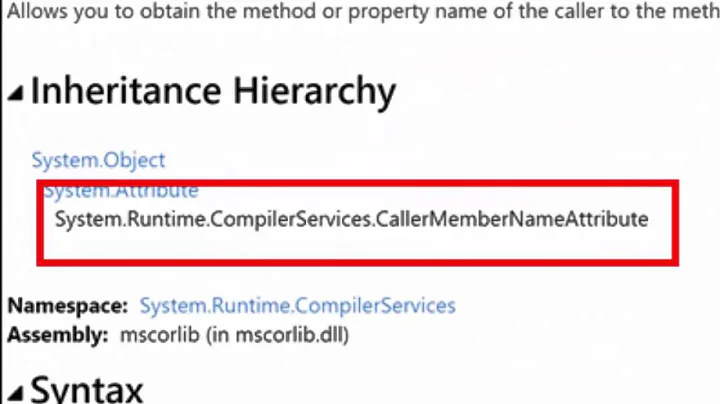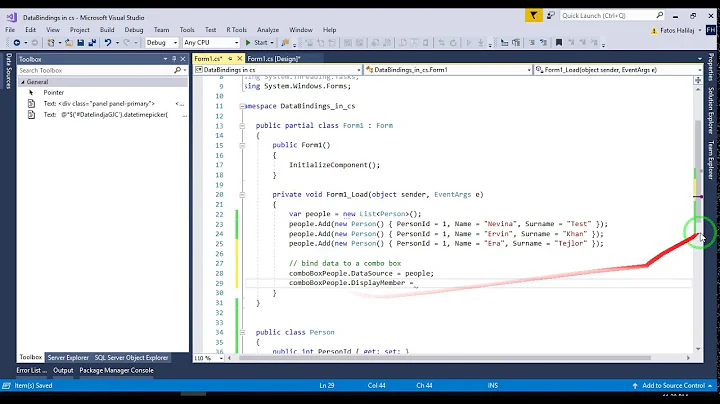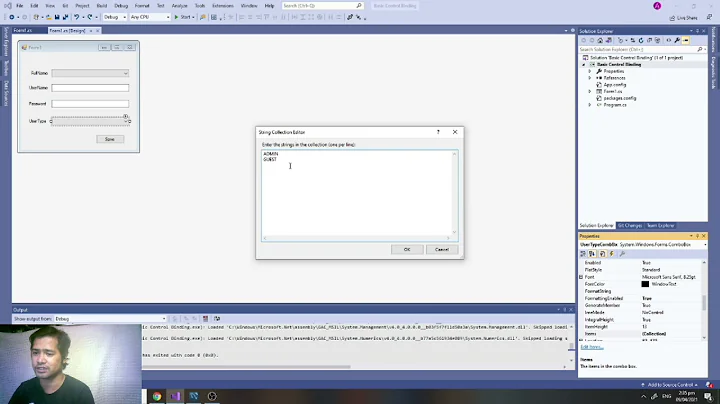Workaround for lack of 'nameof' operator in C# for type-safe databinding?
Solution 1
This code basically does that:
class Program
{
static void Main()
{
var propName = Nameof<SampleClass>.Property(e => e.Name);
Console.WriteLine(propName);
}
}
public class Nameof<T>
{
public static string Property<TProp>(Expression<Func<T, TProp>> expression)
{
var body = expression.Body as MemberExpression;
if(body == null)
throw new ArgumentException("'expression' should be a member expression");
return body.Member.Name;
}
}
(Of course it is 3.5 code...)
Solution 2
While reshefm and Jon Skeet show the proper way to do this using expressions, it should be worth noting there's a cheaper way to do this for method names:
Wrap a delegate around your method, get the MethodInfo, and you're good to go. Here's an example:
private void FuncPoo()
{
}
...
// Get the name of the function
string funcName = new Action(FuncPoo).Method.Name;
Unfortunately, this works only for methods; it does not work for properties, as you cannot have delegates to property getter or setter methods. (Seems like a silly limitation, IMO.)
Solution 3
Unless someone changes their mind, the nameof operator looks like it's coming in C# 6. Here are the design meeting notes about it:
https://roslyn.codeplex.com/discussions/552376
https://roslyn.codeplex.com/discussions/552377
Solution 4
An extension to what reshefm did, that simplified the usage of the nameof() operator, and gives the names of methods and class members and methods as well:
/// <summary>
/// Provides the <see cref="nameof"/> extension method that works as a workarounds for a nameof() operator,
/// which should be added to C# sometime in the future.
/// </summary>
public static class NameOfHelper
{
/// <summary>
/// Returns a string represantaion of a property name (or a method name), which is given using a lambda expression.
/// </summary>
/// <typeparam name="T">The type of the <paramref name="obj"/> parameter.</typeparam>
/// <typeparam name="TProp">The type of the property (or the method's return type), which is used in the <paramref name="expression"/> parameter.</typeparam>
/// <param name="obj">An object, that has the property (or method), which its name is returned.</param>
/// <param name="expression">A Lambda expression of this pattern: x => x.Property <BR/>
/// Where the x is the <paramref name="obj"/> and the Property is the property symbol of x.<BR/>
/// (For a method, use: x => x.Method()</param>
/// <returns>A string that has the name of the given property (or method).</returns>
public static string nameof<T, TProp>(this T obj, Expression<Func<T, TProp>> expression)
{
MemberExpression memberExp = expression.Body as MemberExpression;
if (memberExp != null)
return memberExp.Member.Name;
MethodCallExpression methodExp = expression.Body as MethodCallExpression;
if (methodExp != null)
return methodExp.Method.Name;
throw new ArgumentException("'expression' should be a member expression or a method call expression.", "expression");
}
/// <summary>
/// Returns a string represantaion of a property name (or a method name), which is given using a lambda expression.
/// </summary>
/// <typeparam name="TProp">The type of the property (or the method's return type), which is used in the <paramref name="expression"/> parameter.</typeparam>
/// <param name="expression">A Lambda expression of this pattern: () => x.Property <BR/>
/// Where Property is the property symbol of x.<BR/>
/// (For a method, use: () => x.Method()</param>
/// <returns>A string that has the name of the given property (or method).</returns>
public static string nameof<TProp>(Expression<Func<TProp>> expression)
{
MemberExpression memberExp = expression.Body as MemberExpression;
if (memberExp != null)
return memberExp.Member.Name;
MethodCallExpression methodExp = expression.Body as MethodCallExpression;
if (methodExp != null)
return methodExp.Method.Name;
throw new ArgumentException("'expression' should be a member expression or a method call expression.", "expression");
}
}
To use it:
static class Program
{
static void Main()
{
string strObj = null;
Console.WriteLine(strObj.nameof(x => x.Length)); //gets the name of an object's property.
Console.WriteLine(strObj.nameof(x => x.GetType())); //gets the name of an object's method.
Console.WriteLine(NameOfHelper.nameof(() => string.Empty)); //gets the name of a class' property.
Console.WriteLine(NameOfHelper.nameof(() => string.Copy(""))); //gets the name of a class' method.
}
}
Solution 5
The workaround is to use an expression tree, and to take that expression tree apart to find the relevant MemberInfo. There's slightly more detail and comment in this note (although not the code to pull out the member - that's in another SO question somewhere, I believe).
Unfortunately as expression trees don't exist in .NET 2.0, there's really no equivalent.
One solution to avoid typos is to have a set of accessors which fetch the relevant PropertyInfo for a particular property, and unit test them. That would be the only place which had the string in it. This would avoid duplication and make refactoring easier, but it's a bit draconian.
Related videos on Youtube
Paul Kapustin
Software Engineer, Functional Programming enthusiast, Researcher (Computational Linguistics)
Updated on September 09, 2020Comments
-
Paul Kapustin over 3 years
There has been a lot of sentiment to include a
nameofoperator in C#. As an example of how this operator would work,nameof(Customer.Name)would return the string"Name".I have a domain object. And I have to bind it. And I need names of properties as strings then. And I want them to be type-safe.
I remember coming across a workaround in .NET 3.5 which provided the functionality of
nameofand involved lambda expressions. However, I have not been able to locate this workaround. Can anyone provide that workaround to me?I am also interested in a way to implement the functionality of
nameofin .NET 2.0 if that is possible.-
Mike over 8 yearsThis issue is now solved at compile time! The
nameofoperator was implemented in C# 6.0 with .NET 4.6 and VS2015 in July 2015. The following answers are still valid for C# < 6.0.
-
-
reshefm over 15 yearsI agree. Silly limitation. I don't think it should be too hard for the compiler to understand whether it is the getter or the setter and let u use delegate it.
-
Nicolas Fall about 14 yearsis this what you are looking for? imaginarydevelopment.blogspot.com/2009/10/… it references this stackoverflow.com/questions/1329138/…
-
 Paul Shmakov over 11 yearsPlease note that there is a performance penalty. Expression objects are quite expensive to create. Calling a
Paul Shmakov over 11 yearsPlease note that there is a performance penalty. Expression objects are quite expensive to create. Calling aFoo(Expression<Func<>>)is 200 times slower than an old fashionedFoo(string propName). Please vote for a compile-time nameof operator. -
Arturo Martinez over 9 yearsI've been waiting this for so long. So nice to see it being implemented.
-
lolo_house over 7 yearsI created the generic method: public static string PropertyPath<T,TProp>(this T obj, Expression<Func<T, TProp>> expression) { var s = expression.Body.ToString(); var p = s.Remove(0, s.IndexOf('.') + 1); return p; }
-
DavidRR over 7 yearsAnd here is the official documentation for the
nameofoperator which did indeed become available in C# 6.0 (and Visual Studio 2015). -
DavidRR over 7 yearsFrom the documentation for the
nameofoperator (new to C# 6.0), in the section Remarks: If you need to get the fully-qualified name, you can use the typeof expression along with nameof . -
BillW over 7 yearsNote that this code must have been compiled in VS2015 in order to use Expression.Body











